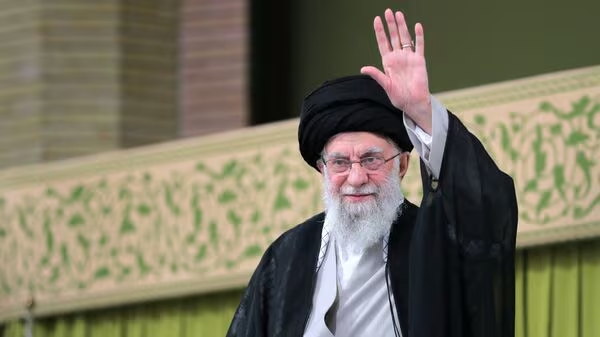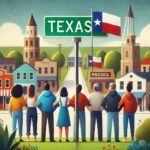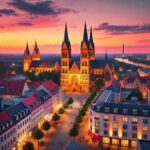Iranian Supreme Leader Ali Khamenei, a prominent figure in Iranian politics for the past three decades, is reportedly in a coma, with unconfirmed reports indicating that his son Mojtaba Khamenei could soon succeed him. The development, cloaked in secrecy, could profoundly alter Iran’s political landscape amid growing pressure on the regime domestically and internationally.

A Power Transition in Iran?
According to a report by Israeli media outlet Ynet News, which cites Iranian opposition source Iran International, 85-year-old Ali Khamenei has reportedly slipped into a coma, leaving Iran’s leadership in a potentially precarious position. In response, the Assembly of Experts reportedly convened a secret meeting on September 26 to discuss succession. During this meeting, the supreme leader’s second son Mojtaba Khamenei was reportedly chosen as his father’s successor. Although Iranian officials have not confirmed these reports, the potential implications of such a change have generated widespread interest.
If true, the transfer of leadership from Ali Khamenei to Mojtaba would mark the first time Iran’s supreme leader has handed his position to a direct descendant, a controversial move that could be seen as solidifying family power within the Islamic Republic.
The Emergence of Mojtaba Khamenei
Mojtaba Khamenei, who is rarely seen in public, has gained considerable influence in Iran in recent years. Known for his conservative outlook, he is associated with Iran’s hardline forces and reportedly played a key role in suppressing the 2009 Green Movement protests. Although his profile has remained largely behind the scenes, Mojtaba’s influence reportedly grew after he was given the title of “Ayatollah” in 2021, a move seen by many as a precursor to potential leadership.
The alleged secretive nature of the Assembly of Experts has fueled speculation that Mojtaba Khamenei intends to finalise his succession before Ali Khamenei passes away. According to sources, the assembly was pressured to reach a consensus as quickly as possible, with members reportedly warned not to disclose details of the meeting. This secrecy reportedly stems from fears that a public announcement could spark widespread unrest.
Iranian Public Reaction and Potential Unrest
Iran’s leadership change is taking place against a backdrop of internal dissent and political discontent. While the Islamic Republic has long maintained a strict system of governance, recent years have seen a surge in protests over issues ranging from economic hardship to human rights abuses. Public opinion of Mojtaba Khamenei is reportedly mixed, with some citizens viewing his potential rise as a sign of deepening authoritarian control. For many Iranians, the prospect of hereditary succession runs contrary to the principles of the Islamic Revolution, which opposed monarchical systems.
Mojtaba’s involvement in past crackdowns on dissent makes him a polarizing figure, raising concerns that his appointment could provoke further unrest. As the Iranian leadership tightens its grip in anticipation of this transition, there are fears that the change could further deepen the divisions between the regime and the public.
What This Means for Iran’s Relations and Future
The power shift within Iran’s top leadership could have significant implications for international relations, particularly relations with the United States and Israel. Iran’s leadership change comes at a time when the country is facing increasing pressure from sanctions, economic instability and rising regional tensions. If Mojtaba Khamenei takes power, analysts predict he will adopt his father’s hardline anti-Western policies, potentially hampering diplomatic efforts with the West.
The supreme leader holds the most powerful position within Iran, overseeing all branches of government, the military and the judiciary. Therefore, any change in leadership could redefine Iran’s approach to both domestic policies and foreign diplomacy. However, without a formal acknowledgement from Iran’s authorities, speculation about Mojtaba’s succession remains just that – speculation.
An unclear future for Iran
With rumors circulating that Ali Khamenei has fallen into a coma, the alleged succession plan comes at a moment of significant uncertainty for Iran. With internal discontent growing, the regime’s focus on secrecy may be its attempt to prevent public reaction. Nevertheless, the growing possibility of Mojtaba Khamenei’s leadership has brought renewed global attention to Iran’s regime.
The lack of transparency in Iran’s leadership transfer raises questions not only about the country’s stability but also the regime’s long-term survival. The prospect of a family succession presents a new chapter for the Islamic Republic, one that could either consolidate its power or lead to more discord. Whether or not Mojtaba Khamenei accepts the role of supreme leader is still uncertain, these developments are a sign of concern for Iran’s ruling elite.This highlights the significant pressures facing this class.
- Ryan Reynolds stands firm amid Blake Lively’s lawsuit against Justin Baldoni and tensions with WME
- Elementary School Horror – 7-Year-Old Child Dies in Heartbreaking Stabbing
- Panama Canal dispute – Trump’s explosive comments reignite debate
- Governor Abbott’s Bold Move – A Chilling Campaign to Deter Illegal Immigration
- Josh Hartnett Shines Brilliantly in Colleen Hoover’s Verity: An Unmissable Gripping Thriller Worth Watching
- Magdeburg: A Thrilling Journey Through History, Culture, and Innovation










